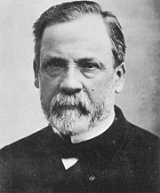
chemist
and microbiologist
born in Dole
. He is remembered for his remarkable breakthroughs in the causes and preventions of diseases. His discoveries reduced mortality from puerperal fever
, and he created the first vaccine
for rabies
and anthrax
. His experiments supported the germ theory of disease
. He was best known to the general public for inventing a method to stop milk and wine from causing sickness, a process that came to be called pasteurization
.
Dans les champs de l'observation le hasard ne favorise que les esprits préparés.![]()
There does not exist a category of science to which one can give the name applied science. There are sciences and the applications of science, bound together as the fruit of the tree which bears it.![]()
L' univers est dissymetrique...![]()
Posterity will one day laugh at the foolishness of modern materialistic philosophers. The more I study nature, the more I stand amazed at the work of the Creator. I pray while I am engaged at my work in the laboratory.![]()
Do not let yourself be tainted with a barren skepticism.![]()
Science knows no country, because knowledge belongs to humanity, and is the torch which illuminates the world. Science is the highest personification of the nation because that nation will remain the first which carries the furthest the works of thought and intelligence.![]()

